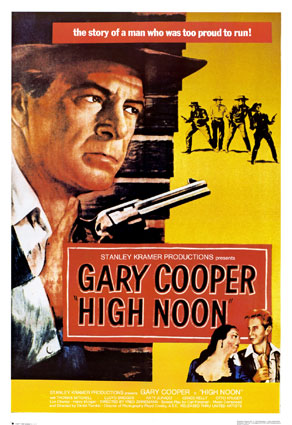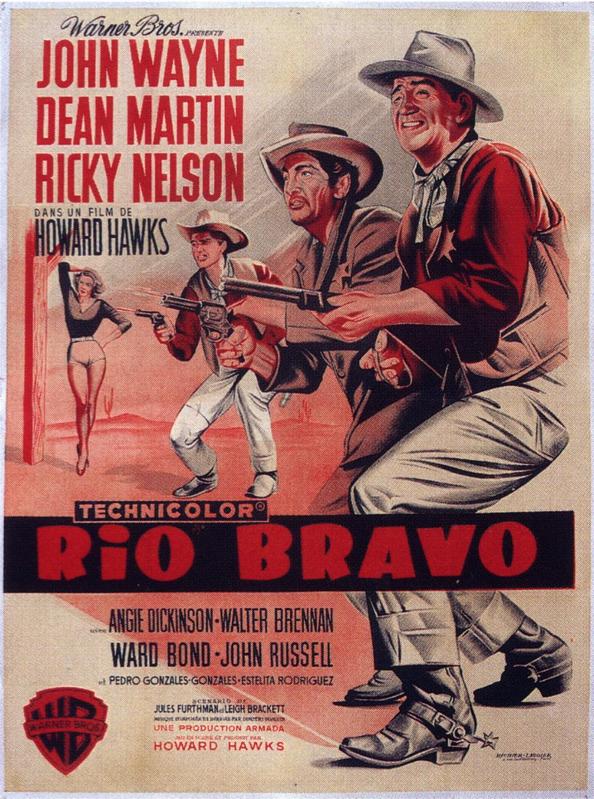HIGH NOON FOR U.S. ARMY
UPI’s Lou Marano uses two old Hollywood westerns, High Noon and Rio Bravo, to illustrate the quandry the U.S. Army faces in Iraq. While amusing, the piece demonstrates an lack of appreciation of both one of the movies and the situation in Iraq.
Marano captures “High Noon” quite wonderfully:
“High Noon” is an inversion of Frank Capra’s “It’s a Wonderful Life” (1947), a film in which the community rallies to aid of the frantic hero. <…> Even the hyper-realistic “High Noon” relies on artistic license, because Kane survives the confrontation with the Miller gang. Kane’s body in the street in the final frame would be too much even for this most “adult” of westerns.
But the last scene generated its own controversy. After the gunfight, the townspeople emerge like ants from their hiding places. Kane regards them disdainfully, pulls off his badge and drops it in the dust, and drives away in a buckboard with his young wife.
This enraged John Wayne and director Howard Hawks, who considered the ending “un-American.” Further, they objected to the idea of a lawman “running around like a chicken with his head cut off” asking citizens for help. A “professional” shouldn’t need any help, they said. The two made “Rio Bravo” (1959) as a rebuke to “High Noon.”
Calls to three midtown Washington Blockbusters and a visit to an independent video shop failed to produce a copy of “Rio Bravo.” Unfortunately, my representation of the move must rely on Internet summaries.
I can’t believe he couldn’t find a copy of “Rio Bravo,” which runs about every day or so on one or another of Ted Turner’s former stations, anywhere in the Metro area. Heck, I’d have lent him mine.
Part of “High Noon’s” power is that it is famously shot almost in “real time.” That is, the span of the story – about 105 minutes – moves inexorably along in a movie of some 83 minutes. (To get the idea, the running time of Richard Attenborough’s 1982 life of “Gandhi” was not 78 years, although it seemed like it.)
Heh. Love the Ghandi line. Although, honestly, I rented “High Noon” on DVD a few months back and really didn’t find it very engaging.
I’ve never seen “Rio Bravo,” but I’ve passed through rooms where it’s been playing on television, and it has never caught my interest. The dialogue seemed slow and self-indulgent, the pace languorous. Its running time is 140 minutes.
“Rio Bravo” is a buddy flick, more than an action adventure movie. The dialogue and interaction with the characters is priceless. Walter Brennan as “Stumpy” the deputy is hilarious. (Although the very similar “El Dorado” was better.)
It’s probably a better movie than I’m allowing, but the premise that “professionals” don’t need help or that it’s shameful to ask is simply wrong.
No, the premise is you don’t send amateurs to do a professional’s job. Ordinary townsfolk are no match for professional killers; best to leave that for people who have spent their adult lives training for the job.
I believe one of the reasons why President Bush has not called for volunteers for the armed forces is because he knows, like Gary Cooper, he wouldn’t get any. Contrary to urban legend, the Sept. 11 attacks did not result in significant numbers of new recruits.
I’ll take his word for the recruitment stats. Of course, I don’t think the recruitment quotas were increased, so I’m not sure we would have seen an increase anyway. More importantly, this isn’t WWII. We’re past the day of mass armies with civilians being taken off the streets and quickly turned into soldiers. It simply takes too long to train professionals after the fact. That’s why we maintain such a large, expensive standing force equipped with phenomenally expensive force multipling technology.
So it’s up to you. Enlist, encourage your sons to enlist, and tell your members of Congress to fund a larger force. But don’t blame the overtaxed volunteers — our “professionals” who need your help.
Very few of our troops have been in theater for a year and deployment overseas is what they signed on for. In World War II, people stayed for the duration. The idea that troops would rotate out of a combat zone in only months is a rather novel idea, although it would likely improve morale. But, to the extent they need relief, it’s from other professional soldiers. It’s conceivable that the force is too small to meet its current mission posture, but a massive wave of volunteers isn’t the answer given the pyramidal shape of the force. Even if we added a few divisions, it’s unclear to me where we would get the leadership.
UPDATE (May 24, 2009): See “Rio Bravo at 50” for more on that classic film.







And what would their task be?
The bulk of our problem is in a very small geographic area. As it stands today, supplying more troops would also supply more targets for the random attacks. I am not saying that more troops would not make the situation safer. It may.
But people think just adding more troops makes the bad guys go away. On the contray it gives them more to shoot at. Yes you can increase force protection by increasing troop strenth but it is does not magically make the bad guys retreat as the media and administration critics would have you believe.
Especially when the bad guys in this case want to become martyrs, they don’t care if they are outnumbered as long as they get a few of our guys.
Paul
I think a case can be made to add another division or two worth of manpower into the army. Noting that, it will not be a short term solution to having approximately half the military power of the US Army stationed in Iraq. As noted in your last sentence, there would be a matter of staffing the newly created (re-activated) forces. More than the staffing problem (which would be no small matter), it would also take a good bit of time to get a new unit up to speed.
—